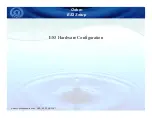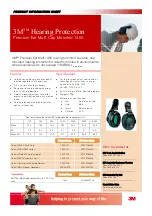
Ottobock | 17
3R60, 3R60=ST, 3R60=KD, 3R60=HD
At heel strike, the proximal joint sections swing posteriorly around the lower axes (Fig. 4, D).
The elastomer bumper (Fig. 2, B) of the EBS unit is compressed as the pivoting mount rotates
(Fig. 3a/3b, Fig. 4, E). This pivoting mount serves as a visual control for measuring the efficiency
of the EBS function. The resistance of the EBS unit is continuously adjustable and can be set for
the weight and activity level of the patient.
The multiaxial action of the joint is composed of rotary and gliding movements. The centre of rota-
tion (instantaneous centre of rotation) varies with the flexion position (Fig. 4, F).
An individually adjustable hydraulic unit located between the axial forks controls swing phase.
It prevents excessive heel rise and dampens extension before initial impact. The hydraulic unit‘s
resistances are independently adjustable.
For optimal function, in addition to proper alignment and adjustments, the patient
must be taught to use the stance flexion feature. The comfort provided by the knee
is most noticeable when walking long distances or on uneven surfaces. Initially, the
patient may be unaccustomed to the cushioned knee flexion provided by the EBS unit
at heel strike. With proper instruction and experience, the amputee will learn to take
considerable advantage of this more natural gait pattern.
Another advantage is the very large knee flexion angle, which goes far beyond the usual range.
The joint does not feature a flexion stop bumper. A flexion angle of more than 175° is technically
possible, and is limited only by the corresponding socket connectors, socket shapes or by the
cosmetic foam cover. However, an even contact surface to the posterior axial fork must be en-
sured (Fig. 10, Fig. 11).
2.5 Different connection systems
The EBS Knee Joint is available in 4 different versions. They differ from each other solely by the
type of proximal connection used (see front page):
Article number
Version
3R60
Knee Joint with adjustment pyramid connector
3R60=ST
Version with threaded connector for long residual limbs
3R60=KD
Version with lamination anchor for knee disarticulation amputees
3R60=HD
Version with adjustment pyramid connector anteriorly angled by 10°
for hip disarticulation amputees
Attention!
For the prosthetic fitting of hip disarticulation amputees the
specially adapted 3R60=HD joint version must be used.
Summary of Contents for 3R60
Page 3: ...5 F 2 4 3b 3a A C B F ICR ICR ICR D E 6 F ICR ICR...
Page 4: ...10 11 8 7 9...
Page 161: ...Ottobock 161 3R60 3R60 ST 3R60 KD 3R60 HD EBS EBS 4 3 2 1 EBS 4 3 2 3 710 10 2 3 F 8 9...
Page 162: ...162 Ottobock 3R60 3R60 ST 3R60 KD 3R60 HD 4 4 3R60 KD ST HD 3S107 3S27 i 519L5 4 5 A Ottobock...
Page 171: ...Ottobock 171 3R60 3R60 ST 3R60 KD 3R60 HD EBS 3R60 EBS 4 3 2 1 EBS 4 3 2 3 710H10 2 3 F 8 E 9...
Page 172: ...172 Ottobock 3R60 3R60 ST 3R60 KD 3R60 HD 4 4 3R60 KD ST HD 3S107 3S27 519L5 4 5...
Page 181: ...Ottobock 181 3R60 3R60 ST 3R60 KD 3R60 HD 519L5 4 5 ISO10328 3 3 5 5 5 1...
Page 189: ...Ottobock 189 3R60 3R60 ST 3R60 KD 3R60 HD ISO 10328 3 3 5 5 5 1 5 2 CE 93 42 EWG IX I VII...
















































